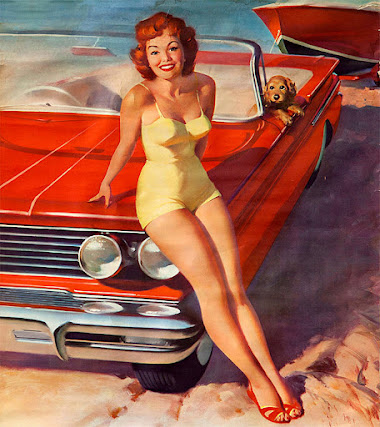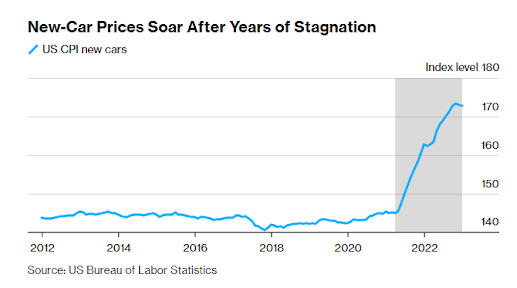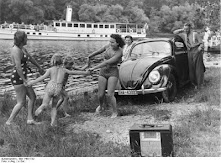Private cars are inefficient and expensive, likely to be the first to suffer from the coming resource crisis. Recent data indicate a crisis in the car market developing right now: prices are growing, while fewer and fewer people can afford cars. Are we going to see the end of cars as we know them (TEOCAWKT)?
Not long ago, at a discussion on electric vehicles, someone rose up from his chair and said aloud, "I have my turbodiesel, and I am going to keep it!" The tone and the attitude implied something like, "and if anyone of those silly greens tries to sell me an electric car, I'll punch him to a pulp." It was a good illustration of the basic rule of politics that says, "nobody wants any change."
Unfortunately for this diesel lover (one of the many), changes are coming, no matter whether people like them or not. Look at these recent data from Bloomberg.

This is an amazing graph, one of a
series illustrating the several rapid changes we are experiencing nowadays. It shows the reversal of a trend that saw cars becoming
more and more affordable over the past 50 years or so. But now, the market is rapidly changing. Prices are soaring, and even used cars are becoming more expensive and difficult to find. Not only are car prices rising, but also those of fuel (especially diesel fuel), maintenance, and insurance. Add to that how governments keep harassing car owners, seen as cash cows to be milked by taxes and traffic sanctions. The results are obvious: A lot of people can't afford cars anymore, Car sales have been declining for several years, but the trend is accelerating, and it will likely accelerate even more in the future (
data from Statista).
We can't say that what's happening is unexpected. Already 50 years ago, the "Limits to Growth" report to the Club of Rome noted that the interplay of resource depletion, pollution, and population increase, would have led to an economic decline during the first decades of the 21st century. It is what we are seeing: people are just becoming poorer. Look at these data (From "
American Compass")
The whole "American way of living," the one that President Bush 1st said was "not negotiable," has been negotiated away already in the 1990s. Maybe "dinks" (double-income, no kids) can still afford two cars in the garage, but for most people, the American dream has truly become a dream. With everything becoming more expensive and salaries not matching the growth of prices, middle-class Westerners -- and in particular lower middle class ones-- have to cut on something. Not buying a new car is often the easiest choice.
Within some limits, having fewer cars and keeping them for a longer time is not a bad thing. It reduces costs and pollution and frees resources for other, more necessary, tasks. Unfortunately, old cars cannot last forever, even assuming that there will be a supply of fuel sufficient to make them run. And the problem is that, in most suburbia, life without a car is nearly impossible. Without cars, people cannot go to work, cannot shop at the supermarket, cannot take their children to school, and the like. Servicing a typical American suburban area with an effective public transportation system is a nightmare: these places were never designed with this idea. So, what's going to happen? Let's sketch a couple of scenarios; remembering that, as usual, the real world will surprise us.
--
The bad scenario. No substantial change is made. Customers remain stuck to their current preferences, the industry focuses on high-end models, where it can still make a profit, and the public refuses to pay for the infrastructure needed for public transportation. Gradually, suburbanites start running out of fuel, of serviceable cars, and of spare parts. Eventually, a large fraction of them becomes unable to move anywhere. Some may be able to work from home, while others turn themselves into backyard vegetable gardeners. But in most cases, no mobility means no job, and no job means no money. That leads to the complete crash of the economic system of vast suburban areas. Suburbanites try to relocate to crowded city centers that can still be supplied with food and other goods, but only a few succeed. For the others, it is the
zombie scenario.
--
The good scenario. The transportation system is reorganized around less expensive vehicles. The industry moves to produce a new generation of light and efficient cars inspired by the old VW "Beetle," but in an electric version that can be recharged by local PV plants. These cars can be made lighter by implementing substantially slower speed limits than the current ones so that they don't need the current cumbersome safety equipment. In time, these vehicles could evolve into the system known as
TAAS (transportation as a service) based on shared ownership and autonomous vehicles, but that's not strictly necessary. The new vehicles are supposed to give suburbanites sufficient mobility to be able to survive as we gradually adapt to a world where natural resources have become rare and expensive.
The first scenario (the "bad" one) seems to be unfolding right now. The backlash against electric vehicles and renewable energy
is in full swing, and we are moving blithely and assuredly toward the desperate attempt to keep alive things that we shouldn't try to keep alive.
The other scenario, the "good" one, would need a strong leadership and the capability of governments to force the industry to produce cheap vehicles, something that the industry does not want to do. It is an unlikely scenario considering another fundamental political principle, "nobody can plan anything." But it is not impossible.
So, as usual, the future is uncertain. There are intermediate scenarios, but the current heavy and expensive cars certainly have no possibility of surviving. In the long run (perhaps even a medium one) TEOCAWKT is unavoidable.
I had already examined this point in a previous post on "Cassandra's Legacy," five years ago. The current events seem to confirm my previous interpretation.
 This is an amazing graph, one of a series illustrating the several rapid changes we are experiencing nowadays. It shows the reversal of a trend that saw cars becoming more and more affordable over the past 50 years or so. But now, the market is rapidly changing. Prices are soaring, and even used cars are becoming more expensive and difficult to find. Not only are car prices rising, but also those of fuel (especially diesel fuel), maintenance, and insurance. Add to that how governments keep harassing car owners, seen as cash cows to be milked by taxes and traffic sanctions. The results are obvious: A lot of people can't afford cars anymore, Car sales have been declining for several years, but the trend is accelerating, and it will likely accelerate even more in the future (data from Statista).
This is an amazing graph, one of a series illustrating the several rapid changes we are experiencing nowadays. It shows the reversal of a trend that saw cars becoming more and more affordable over the past 50 years or so. But now, the market is rapidly changing. Prices are soaring, and even used cars are becoming more expensive and difficult to find. Not only are car prices rising, but also those of fuel (especially diesel fuel), maintenance, and insurance. Add to that how governments keep harassing car owners, seen as cash cows to be milked by taxes and traffic sanctions. The results are obvious: A lot of people can't afford cars anymore, Car sales have been declining for several years, but the trend is accelerating, and it will likely accelerate even more in the future (data from Statista). 





Hello Ugo. Thanks for the link to your older post. I hadn't seen it before.
ReplyDeleteBy now, you have written enough posts that you could probably just provide links to an older post or two on every subject related to the coming Seneca cliff, yet you continue. Amazing, actually.
Anyway, going car free is a thing over here in the US among the young people. Bycycles, scooters, ebikes, and Ubers seem to be the main ways they have to get around.
Well people going car free can't happen fast enough in my eyes. Without cars cycling and public buses become a much more attractive option. Cycling will be much safer on roads not dominated by cars and buses could see an upsurge in popularity with routes that had been closed brought back into service. Even if we are too stubborn to invest in new infrastructure roads are very good for bicycles, buses and coaches. Oh and don't forget the joy of walking.
ReplyDeleteThe first scenario doesn't mention the human response to denial. If I'm now without car, prospects, food etc any car and person who can afford it are fair game. They will be hunted, looted, robbed. Human nature is like that, ask the man who wanted his turbo automobile.
ReplyDeleteTEOFAAWKI - The End of Fuel Abundance As We Know It - for some of us
ReplyDeleteB-52s, Sukhois and similar can be sent to reduce the oil consumed in a nation - obviously...
A miserable nation like Iraq, Syria, Libya, Yemen, Ukraine and Russia...
Or, after sending the Phantoms, Harriers and Tupolevs - fuel supplies available for those nations - are reduced to the minimum, if at all (and grid electricity, too)...
"A [typical, BAU] severe fuel crisis hits Salah al-Din, Iraq" - a fresh youtube post uploaded yesterday...
Iraq exports 4.5 million b/d of gold-grade crude oil (enough to cover all 1.5+ billion population-India's daily consumption of oil)...
Some say another 7 m b/d are actually exported daily - not put on any book - and they might be what's behind the perceived boom in America's production of what's called Shale Oil - only started to occupy the news and International Energy Reports after the last 2003 invasion of Iraq - a speculation far-fetched, though.
Now, is it TEOCAWKT or an Energy Musical Chairs Game?
Cars - as we know them - will not change for a while, but rather the user-base is being forced to shrink - seems what is going on - watch the video above and you'll agree...
"In any system of energy, Control is what consumes energy the most.
No energy store holds enough energy to extract an amount of energy equal to the total energy it stores.
No system of energy can deliver sum useful energy in excess of the total energy put into constructing it.
This universal truth applies to all systems.
Energy, like time, flows from past to future".
Wailing.
With any technology, there will be problems if the user base is suddenly forced to shrink, where the economic basis for it, and for the whole supporting infrastructure was based on the assumption that the user base would always be growing. Suddenly yesterdays investments are now liabilities.
DeleteAgreed. This underlying assumption of infinite growth is the reason for building the infrastructure in the first place, and once it's built, we will keep using ( and maintaining) it until we literally can't afford it.
DeleteSo building new infrastructure (be it bike lanes, trolley cars, moving sidewalks, or landing pads for the flying cars we were promised 50 years ago just never gets built. The suburbs may eventually become the world's largest class of "stranded assets" without transportation.
What I have seen in my country, which is tropical, is that people get out of their car to get on motorcycles whether electric or gasoline, even people who usually use the bicycle. But in a country with seasons and severe cold climates, the options are reduced, but Europe has it better solved than the United States. What is going to happen is that there are people who provide the transport service using small buses and there is a regrouping of commercial and industrial activities. That people are going to be poorer, there is no discussion.
ReplyDeleteIt will be terrible!
ReplyDeleteAir pollution greatly reduced
People walk and bicycle without fear of being hit by cars.
Obesity no longer a problem
Reduced mining and manufacturing, less CO2 and mineral depletion
If LTG is to be believed, we also won't have to worry about an aging population! (death rates will go up dramatically as industrial production declines).
DeleteYou're right, it might not be terrible.
I ride a bike in Berlin and I would say I am good at it. Cars are not my problem, it's the other cyclists. There are bicycle highways here - I avoid them. If Berliners all switch to bicycles, there will be a lot more accidents. Even fatal ones.
DeleteMit Grüßen von Marcus
Same here in Madrid. The problem is made worse by politicians building bicycle lanes, instead of teaching people how to ride properly, they consider cyclists to be incompetent children. So we are getting kicked out of the roads, trapped into dangerous cyclist ghettos filled with cyclists that never cared to learn.
DeleteHello again. This is ArtDeco again, since I always forget to sign my posts ... the first one and the one about stranded assets are both me. If this link works, there is an alternative to cars and the infrastructure is cheap comparedtocars ....
ReplyDeletehttps://www.cnn.com/travel/article/best-bicycle-cities-
If a short-term (probably) price spike fueled by material shortages caused by the world reaction to COVID is the basis of the prediction of TEOCAWKT, I'm dubious of the claim in the short term. Long-term, of course, the current car concept is doomed, and the structure of American suburbia will create a lot of problems with what will follow.
ReplyDelete"The other scenario, the "good" one, would need a strong leadership and the capability of governments to force the industry to produce cheap vehicles."
ReplyDeleteTo make it happen leadership would have to be strong. Strong and ruthless to enemies who would fight dictates, as madness will win by any means necessary.
Lead acid batteries and plastic cars. 100 kph top speed and 160 kilometer range. Charged over night. Forced limits, small carbon footprint. Old batteries recycled into new batteries. Sustainable. People forced by a * Minimum Working Technology to use cars for essential needs only.
A dream for a Sci-fi story since it won't happen in real life. It would be progress, but few will agree. A stepped-back life-style is a choice few can think to see. For most it is,
Oh Lord won't you buy me a Tesla, My friends all ride Skateboards. I must make amends.
* Minimum Working Technology - Technology that gets the job done. Society continues to function using a MWT. Perhaps with a limp, but society functions. Perfect Minimum Working Technology does not erode the environment or deplete resources. Efficiency is sacrificed to favor other qualities. More efficient technology can exist, but externalities make using a more efficient technology taboo, unless the efficient technology has a comparable MWT rating.
A MWT rating ranges between. 0 and 1.
Passenger Pigeons harvest and processing once fed people on trains. That technology had a low MWT rating, close to 0. Not actually 0 since the birds did not go extinct in one year. It took a few.
A permaculture dude who has a sustainable free range chicken farm has a MWT rating close to 1 provided permaculture dude does not use fossil fuels.
*****
I love the picture of the dog in the Chevrolet.
Forced Limits? They create 15 min citys here. Thats nothing else than Ghettos. I say no to your damn forced limits!
DeleteMarcus
Electric vehicles and "renewable" energy have all the same problems as internal combustion engine vehicles and non-renewable energy. There has been so much written on this Ugo - the maths is simple. It's time to get out of denial
ReplyDelete'The choice has always been 'better to reign in hell than serve in heaven'. When civilization is at it lowest, you expect some replacement or adaptation or reversion to some earlier period. The roaring 20's was more sustainable than now. I think things will be quite a bit different than you imagine then Hugo.
ReplyDeleteThe Roaring Twentys is the century from 1929 to 2029.
DeleteJust sayin' 😌 ArtDeco
there will not be a collapse this century said the earth4all team members !
ReplyDeleteHey Ugo, i track peak cars since 2019. See here: https://www.wallstreet-online.de/diskussion/1157619-1-10/peak-oil-und-die-folgen
ReplyDeleteand here:
https://limitstogrowth.de/2022/02/22/buchtip-die-kurze-endphase-des-oelzeitalters-von-berndt-warm/
Peak Car is the logical consequence of Peak Oil, cause by thermodynamics.